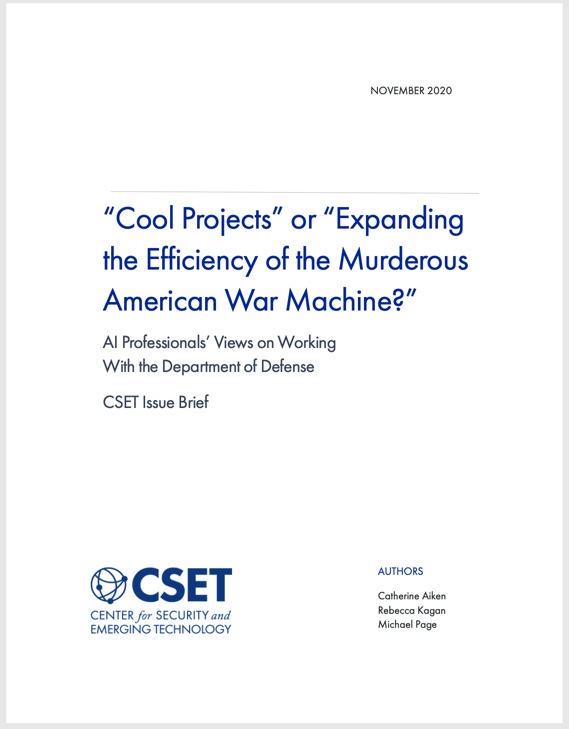Executive Summary
In a world where computing technologies such as artificial intelligence are increasingly critical for government operations and national security, the nature of the relationship between the U.S. tech industry and the Department of Defense is important. Recent highly publicized incidents of tech employee pushback against DOD-funded AI projects have created the perception of a rift between the tech industry and DOD. If true, such a rift would have serious implications for public policy, national security, and the future of AI. But are recent examples of employee pushback representative of the feelings of the entire tech industry? Specifically, how do tech professionals with AI-relevant skills feel about working on DOD-funded projects?
To better understand the tech industry-DOD relationship, CSET surveyed 160 U.S. AI industry professionals with AI-relevant skills (AI professionals) about their views on working on AI projects funded by DOD grants or contracts (DOD-funded AI projects). We find that AI professionals hold a broad range of views about DOD generally and working on DOD-funded AI projects specifically.
Key findings from the survey include:
Most AI professionals are positive or neutral about working on DOD- funded AI projects. Nearly 40 percent are neutral and 38 percent are extremely or somewhat positive. Less than a quarter of respondents feel extremely or somewhat negative about working on a DOD-funded AI project.
AI professionals consider interesting research opportunities and the ability to do good to be the most compelling reasons to work on DOD-funded AI projects. Respondents who feel positively about working on DOD-funded AI projects also consider the ability to influence DOD to be a compelling benefit.
AI professionals’ discomfort with how DOD will use the technology and concerns about causing harm were the most common reasons not to work on DOD-funded AI projects. Respondents who feel negatively about working on DOD-funded AI projects were particularly concerned about DOD’s use of the technology.
AI professionals are more willing to work on DOD-funded AI projects with humanitarian applications, as opposed to battlefield or back- office applications. Additionally, the ability to provide a global humanitarian benefit is the most frequently cited factor that would increase willingness to work on a DOD AI contract.
AI professionals’ willingness to work on DOD-funded AI projects is also increased if the funding is used solely for basic research. Stronger commitments to safety and privacy as well as projects with defensive applications increase willingness for around 40 percent of AI professionals.
AI professionals who worked at an employer with DOD contracts and those more familiar with DOD tend to be more positive about working on DOD-funded AI projects. Just over half of respondents have worked or currently work at an employer with DOD contracts and about a quarter worked directly on a DOD-funded project. About half of surveyed professionals consider themselves at least somewhat familiar with DOD.
AI professionals consider their employer and academia to be the most trustworthy actors to develop AI in the public interest. A minority of AI professionals trust the U.S. government and military to develop AI in the interest of the public. Compared to surveys of the broader American public, AI professionals have lower levels of trust in the U.S. military’s ability to develop AI but higher levels of general trust in the U.S. government.
